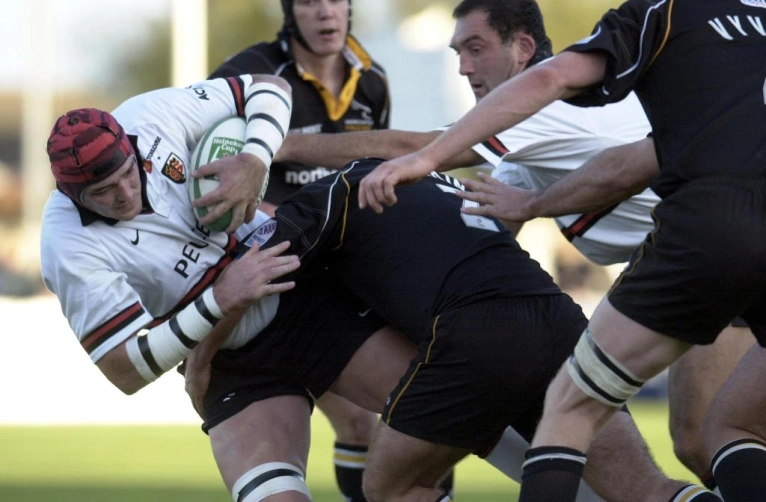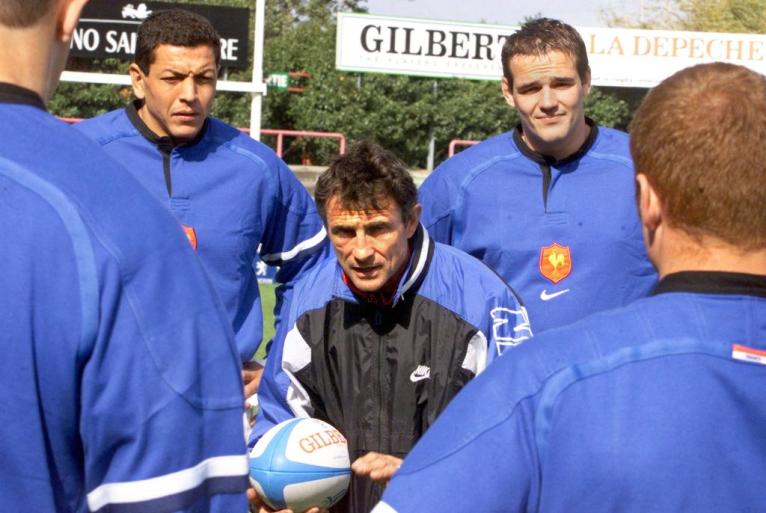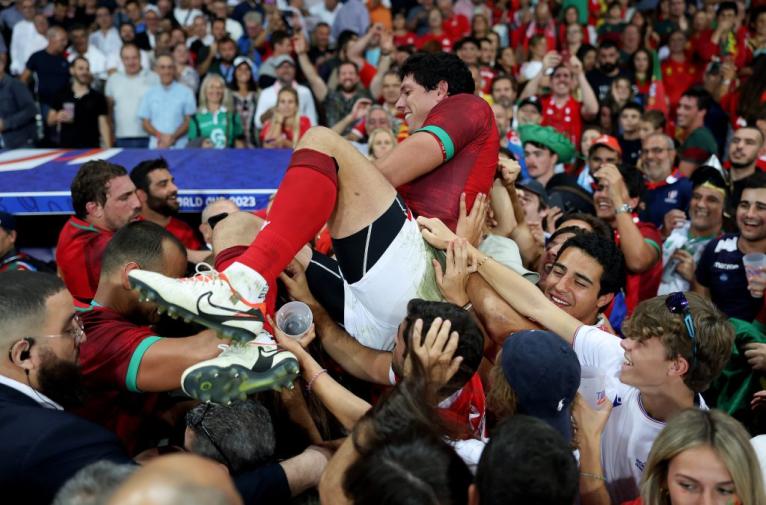From frosted tips in Ibiza, Jonah Lomu, American football, diving into the stands to reach his family, broken hips, bloodied shirts and waking up every day with a smile, David Gérard’s life could easily inspire a spectacular movie or TV series. The former Toulouse lock and current Romania coach has seen and done it all.
After helping Portugal to stunning success at Rugby World Cup 2023 as an assistant to Patrice Lagisquet, Gérard moved to Bucharest, intending to help rebuild the Stejarii after several troubling years. This dispiriting period culminated in a bleak World Cup – Romania’s poorest in history – and much soul-searching for what had once been a powerful player on the international scene.
One season in, Gérard and his staff turned the proud rugby nation around. He has guided them to wins over Tonga, Canada and USA, and by reaching Sunday’s Rugby Europe Championship semi-final against Georgia, sealed qualification for Australia 2027.
Flights booked 🎟️@RugbyRomania will be making their way to Men’s Rugby World Cup 2027 🇷🇴#RWC2027 pic.twitter.com/6kIZQcr7CH
— Rugby World Cup (@rugbyworldcup) February 9, 2025
“I remember when I was about to sign with the Romanian union, a lot of people came to me and said ‘David, it isn’t the right choice. It is going to be complicated and incredibly hard’,” Gérard tells RugbyPass. “I signed and have not looked back since. I have no regrets, especially because the players and staff have given everything for this country.”
Gérard and his staff first addressed the players’ fitness to make them more competitive. He can no longer pick from a raft of elite France-based talent. Romania’s influence abroad has diminished since the 2010s, with no Top 14 players and just a few ProD2 additions in their current squad, increasing the importance of time spent in the national camp.
But for Gérard, it is vital Romania looks forward with optimism.
“It is important for us to stop complaining and looking down. We need to find solutions, look ahead, and be more positive. Before we travelled to Mons to play Belgium and qualify for Australia, I told my players ‘Every morning I wake up with a smile on my face. Why? Because I feel lucky. I have a great staff, I have dedicated players who are also great people. And rugby is my passion. It isn’t just my job; it is my passion.’
We didn’t beat Tonga because we were better. We won because we had more determination. We wanted it more!
“Complaining solves nothing at all, but passion and determination, yes. I don’t want to feel frustrated all the time. In the end, what I seek to do with the Romanian team is to implement a vision. My time here is temporary, but I want to be remembered as someone who built something positive.”
In that respect, Gérard is already seeing psychological gains.
“Let’s talk about progress. Romania faced Tonga in the World Cup and lost 24-45. Last year we faced them again, and won 25-15. We didn’t beat them because we were better. We won because we had more determination. We wanted it more! This is what I want to see from them. We want to prove to ourselves what sort of team we are.”
With all this talk about positivity and hope, was Gérard always like this? Born in 1977, he was raised as an only child in a humble neighbourhood of Toulon. He longed to become an NFL star and even represented France Under-18s in the sport.

“Going to America was impossible for me, as we didn’t have the means,” he says. “From that day, I said to myself I would make the Top 16 and become a French international.”
Gérard will certainly never forget his first match for his local club as a bright-eyed 17-year-old eager to make an impression.
“It was a home game against Dijon, a packed stadium and I came on as a replacement. I think there were only about ten minutes left. So, I came in and made an immediate impact, by breaking the hips of one of my team-mates. I came rushing into the ruck, set on cleaning out a Dijon player, but I missed him, and I clashed with my teammate Michel Périé. It was a very funny moment.”
Still in his teens, Gérard would soon make a seminal move to Bordeaux-Bègles. He reflects with self-deprecation about the boy who left home for Bordeaux some 30 years ago, the heartache he faced and the challenges he conquered.
I didn’t have a car, which made things even worse. I knew it was going to be a sacrifice and I was going to break my mother’s heart.
“It was horrible, a nightmare [to leave home]. Imagine moving to a city 750km from my hometown. I didn’t have a car, which made things even worse. I knew it was going to be a sacrifice and I was going to break my mother’s heart. But I wanted to help my family, and going to Bordeaux was my best shot at making that goal possible.
“The first three months were soul-crushing, as I was completely alone, didn’t know anyone and I was a kid in a senior team who were all fighting for their survival.
“Oh, I was a complete idiot. At the time rugby was played in a very aggressive way, and the environment was the same. I was just a kid who had started to take his first steps in the newly professional rugby world. Baby-faced, young, with lots of heart and passion.
“Playing in the Top 16 aged 17 wasn’t normal. It was such a great experience to have the chance to tackle a new stronger opposition every new week.”
Although he never made it to the NFL, Gérard would soon hit the big time in rugby, earning his first and only cap for France on the 1999 tour of New Zealand. However, the burgeoning lock was not entirely happy to receive his call-up.

“I didn’t want to go. I actually got angry. I was the captain of the French U21 team and we were going to compete for the U21s World Cup. I wanted to be with my teammates and friends. The head coach of the U21s called me and basically said I had to go with the seniors. I was shocked! ‘Why?’ I asked. And he said, ‘The senior team has called you to go to New Zealand.’. My response was ‘Okay… can I refuse?’. He was slightly surprised, but he said I couldn’t refuse and I had to go on the tour. I was mad.
“It was a fun tour, but it was strange too. I remember the staff asking me if I jumped in the front, middle or in the back, or if I played as a four or five. If they called me up, they surely knew who I was? But, well, it was a one-month tour, and it was a one-month nightmare! We played four games, conceded more than 200 points and only won one game. It was tough, I can’t lie.”
After 1999, Gérard moved from Bordeaux to Toulouse, and in his first season, lifted the Top 14 shield. He went on to win two Heineken Cups with the juggernaut club.
“Toulouse loves rugby. It is part of the city, of its history. They want to win. They don’t want only to play and compete. That’s why they are the best in the World. People think they are arrogant, but they aren’t. They just want to leave their mark and show they are the best.”
I went to the president and said ‘I want to bring my family to the game, can you help me?’ He gave me an advance on the next month’s salary. I brought them all. I remember my mother crying, and me doing something stupid.
In his debut season, he played in most games and started the Top 14 final against Clermont, a match that had it all.
“Clermont had beaten us two times in the season and there was an immense rivalry. But when I stepped into the tunnel, I knew we were going to win. The final was even more special because my family attended, thanks to our president, René Bouscatel. I went to him and said ‘I want to bring my family to the game, can you help me?’ He gave me an advance on the next month’s salary. I brought them all. I remember my mother crying, and me doing something stupid. Between the stands and the pitch, there was an empty space. Well, I wanted to reach my parents, so I dived into the stands. The security guys weren’t happy.”
After spells with Northampton Saints and Racing, Gérard was heading towards the sunset in 2009. That was before he received a special call from an icon.
“Do you know why I signed with Marseille? Because of one guy: Jonah Lomu. We had met more than a handful of times, so we weren’t strangers to each other. He picked up the phone and called me saying ‘I am going to Marseille, and I want you to come with me.’ I packed my bags and went there.”

Gérard’s final day as a player and the beginning of his life as a coach came in 2011, but he had long known a coaching career was in his future. He was 12 years old when he took on his first coaching ‘role’, helping the Under-6 team at a local football club. His first job proper came with women’s club Avenir Fonsorbais, who would later be integrated into Toulouse, before working with the French Galacticos of the future: Romain Ntamack, Peato Mauvaka, and Matthis Lebel.
“It was and still is important for me to let the players know the good side of becoming a pro player, as well as to talk about my failures to prepare them in the best way possible,” he says.
“It is vital to me they are good humans. I was honest and truthful to them, and I tried to teach them how to hear certain things, so they could progress and become even better.”
He had turbulent spells with Beziers, Lyon and Montauban, when the club was rocked by the desperate loss of player Kelly Meafua to suicide. After such a tragic experience, Gérard sought time away from rugby, but when one door closes, another opens. An old French adversary in Portugal picked up the phone. Lagisquet rang Gérard and invited him to watch the Lobos prepare for their 2023 REC semi-final against Georgia. Gérard offered some frank feedback. Lagisquet offered him a job.
“The players were incredible, accepted all the changes and got on board with my ideas. For instance, the lineout calls were in French and English before my arrival. Nothing in Portuguese, nothing. I asked them ‘Are you English? Are you French?’ and they replied with a no. We changed it to Portuguese and after the first session, I thought I had broken the pack. Players bumped into each other in the lineout, the hooker didn’t know when to throw the ball. But it was a part of progress. We improved a lot.”
Lagisquet, Gérard and their players made history in France, earning Portugal’s first World Cup win against Fiji after a gut-wrenching draw with the Lelos and credible showings against Australia and Wales.
“I went berserk before the Fiji game,” Gérard says. “In the weeks beforehand players were a bit angry because the union wasn’t allowing them to keep the shirts from each game. And I picked up a shirt, placed it in the middle of the circle and said to them, ‘The shirt is yours when it has blood on it. When it is bloodied, you can take it home. Until then, it isn’t yours. No more complaining, you are playing in my home, Toulouse. My mother is here. The whole stadium is pushing for you. Stop complaining. Do you want the jersey? Fight for it then.’ They went crazy.”
Though he has many coaching years ahead of him, 47-year-old Gérard is already building a formidable legacy in nations where rugby is beginning to flourish. How would he like to be remembered?
“As a crazy man. No, honestly? I was a passionate guy and did my best. I don’t care if people remember my presence or not, what matters is I know that I did my best and shared what could with players and staff.”
Actually, there’s one last piece of this eclectic puzzle. In the 2000s, Gérard sported bright blonde hair with frosted tips. Why?
“Ibiza. I am big music fan. I love house, happy house. I was a very serious player, but at the end of every season, I had to go to Ibiza for one week. And before travelling there, I had to bleach my hair. It is part of the Ibiza process.”
From Balearic raves and tub-thumping speeches to Heineken Cup glory and World Cup history, Romanian rugby has a powerful advocate.


Parabéns Francisco! Excelente entrevista 👌